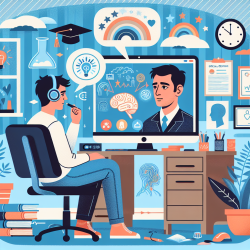In the evolving landscape of therapy, the rise of video conferencing platforms (VCPs) has been significant, especially in the wake of the COVID-19 pandemic. For practitioners at TinyEYE, who provide online therapy services to schools, understanding the nuances of VCPs is crucial. Recent research by Jerkku, Nordin, and Kaiser titled "Emotional activation in video conferences equals that in in person meetings" offers valuable insights that can help practitioners enhance their skills and confidence in using online therapy.
Understanding Emotional Activation
The study focused on comparing emotional activation during autobiographical recall sessions conducted via VCPs and in person. Emotional activation was measured using physiological data (heart rate and skin conductance) and self-assessment of affects. The results showed no significant differences in emotional activation between VCP and in person sessions. This suggests that VCPs can be as effective as in person meetings for eliciting emotional responses.
Practical Implications for Practitioners
Based on these findings, here are some practical tips for practitioners looking to improve their online therapy skills:
- Confidence in VCPs: The research indicates that VCPs can effectively activate emotions, similar to in person sessions. Practitioners should feel confident in the efficacy of online therapy.
- Focus on Emotional Activation: Since emotional activation is a key component of therapy, practitioners should utilize techniques that effectively elicit emotional responses, regardless of the medium.
- Address Client Concerns: Clients may have reservations about online therapy. Practitioners should address these concerns by sharing research findings that support the effectiveness of VCPs.
- Continued Education: Staying updated with the latest research and techniques in online therapy will help practitioners provide the best possible care.
Encouraging Further Research
While this study provides valuable insights, further research is necessary to explore other aspects of online therapy, such as the therapeutic alliance and long-term outcomes. Practitioners are encouraged to engage in or support ongoing research to continually improve the practice of online therapy.
To read the original research paper, please follow this link: Emotional activation in video conferences equals that in in person meetings.










